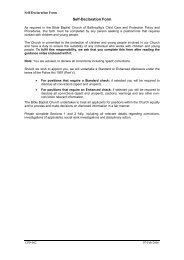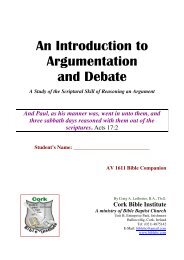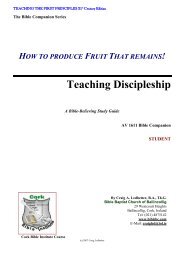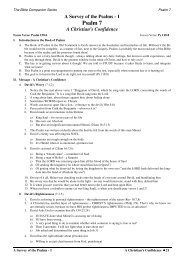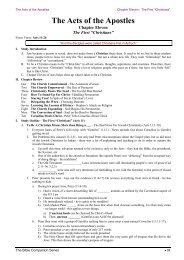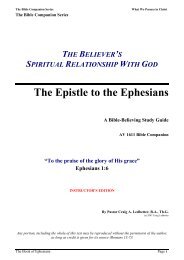THE DOCTRINE OF SALVATION - Student.pdf - Bible Baptist ...
THE DOCTRINE OF SALVATION - Student.pdf - Bible Baptist ...
THE DOCTRINE OF SALVATION - Student.pdf - Bible Baptist ...
Create successful ePaper yourself
Turn your PDF publications into a flip-book with our unique Google optimized e-Paper software.
Soteriology<br />
The Vocabulary Of Salvation.<br />
inactive (but does not remove) the body of sin and makes it powerless. (See also Eph.<br />
4:22-24; Col. 3:9, 10.)<br />
c. “ ye” (Rom. 6:11,12). This simply means that by faith we are to act upon these facts<br />
regardless of any personal feelings.<br />
d. “ ye” (Rom. 6:16-23).<br />
1) We are to stop yielding (present tense) our body members as instruments of unrighteousness.<br />
2) We are to once for all (aorist tense) yield our body members as instruments of righteousness.<br />
e. “ ye.” Whom are we to obey?<br />
S. Glorification.<br />
1) The Christian is to obey his new Master and to ignore his old one (Rom. 6:16). We can serve<br />
but one master at a time (Mt. 6:24).<br />
2) The Christian is to obey that form of doctrine into which he has been delivered. (The Greek<br />
verb “delivered” is the second person plural.) He was originally saved by being poured into<br />
the mold of salvation. He is now to obey the precepts of this mold and let it fashion and<br />
shape his new life.<br />
3) Why are we to obey?<br />
a) Because we are “ ” (6:22). There are three Latin theological<br />
terms which may clarify this precious doctrine. These are:<br />
b) Non posse non pecare—not able not to sin. This refers to believers before their salvation.<br />
c) Posse non pecare—able not to sin. This describes them after their salvation. They now<br />
have the power to live victorious lives. Non posse pecare—not able to sin. This<br />
describes their existence after the rapture.<br />
d) Because God desires the fruits of justification from believers which can only come<br />
through (6:21, 22).<br />
“Moreover, whom he did predestinate, them he also called; and whom he called, them he also<br />
justified; and whom he justified, them he also ” (Rom. 8:30).<br />
“By whom also we have access by faith into this grace in which we stand, and rejoice in hope of<br />
the glory of God” (Rom. 5:2). “For I reckon that the sufferings of this present time are not<br />
worthy to be compared with the glory which shall be revealed in us” (Rom. 8:18).<br />
“It [the human body] is sown in dishonor; it is raised in glory” (1 Cor. 15:43). “When Christ, who<br />
is our life, shall appear, then shall ye also appear with him in glory” (Col. 3:4).<br />
“The elders who are among you I exhort, who am also an elder, and a witness of the sufferings<br />
of Christ, and also a partaker of the glory that shall be revealed” (1 Pet. 5:1).<br />
1. The meaning of glorification.<br />
a. It refers to the ultimate and absolute physical, mental, and spiritual of all<br />
believers (Rom. 8:22, 23; 1 Cor. 15:41-44, 51-55; 2 Cor. 4:14-18; 5:1-4; Jude 1:24, 25).<br />
2. The time of glorification.<br />
a. It will begin at the rapture/resurrection and continue throughout all eternity (1 Cor. 15:51-53; 1<br />
Thess. 4:13-18.)<br />
3. The purpose of glorification.<br />
Cork <strong>Bible</strong> Institute Page 25








